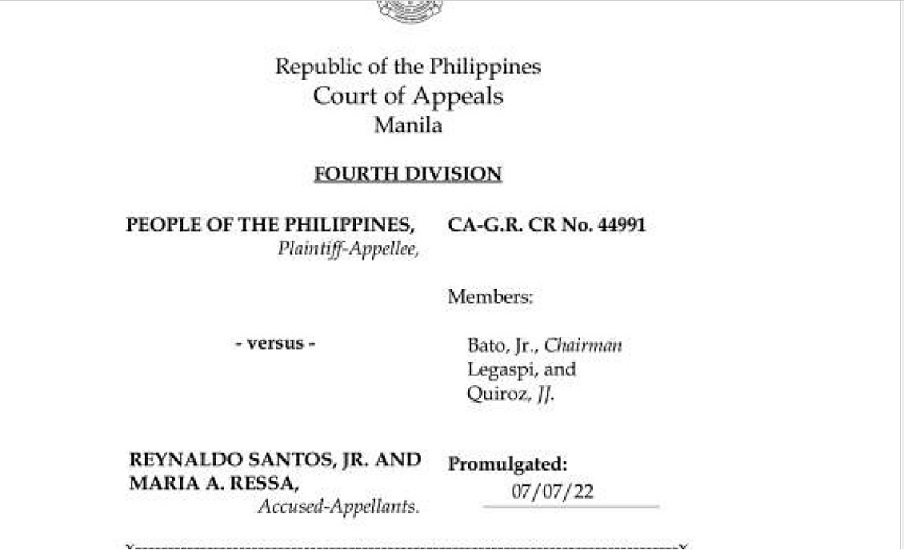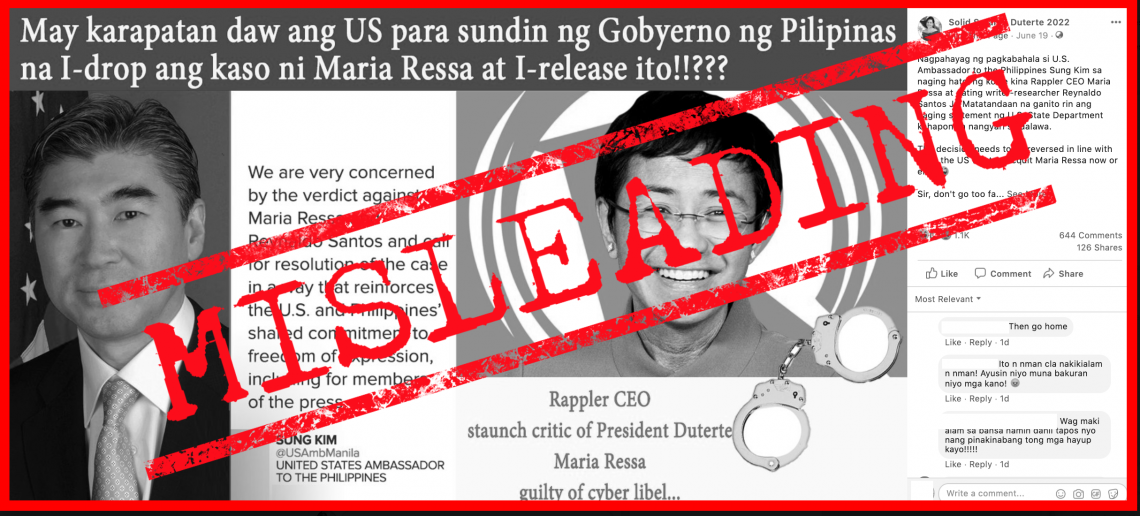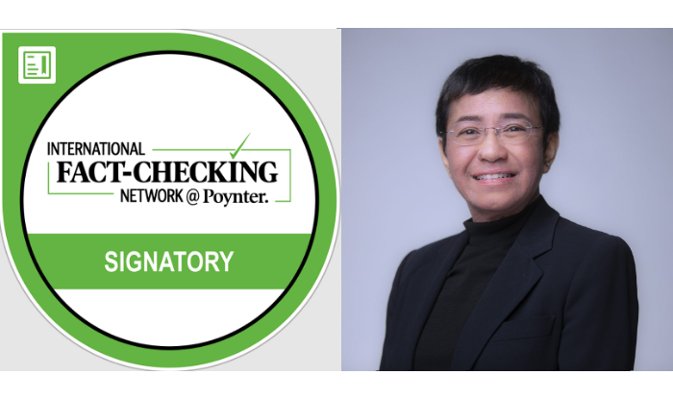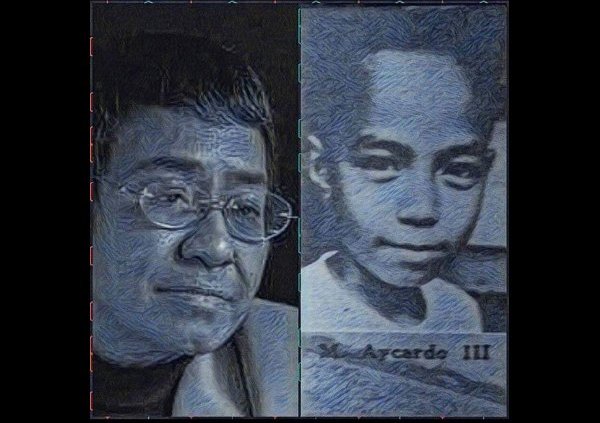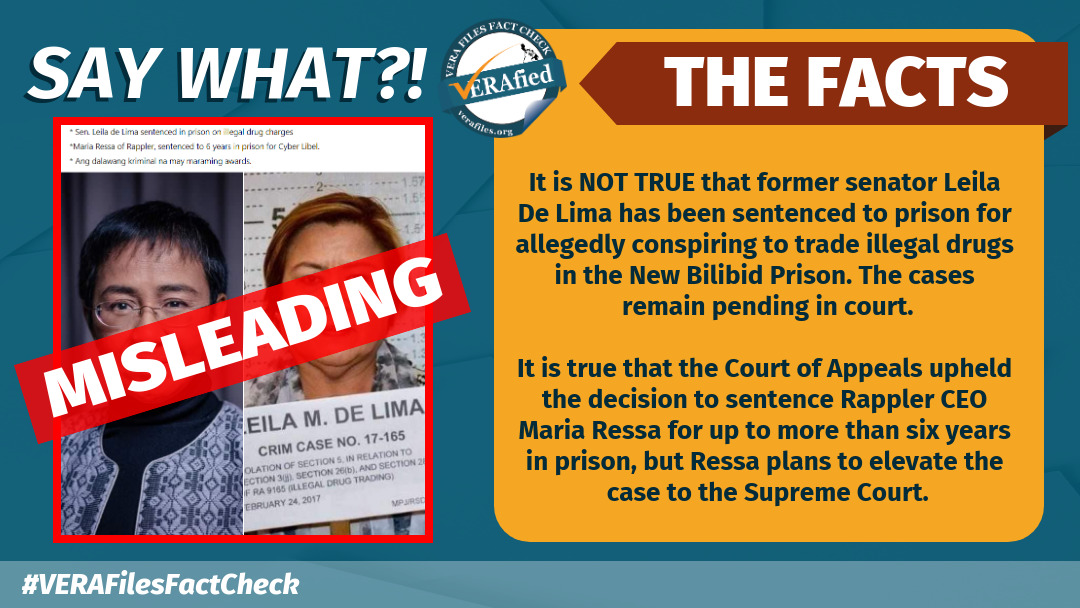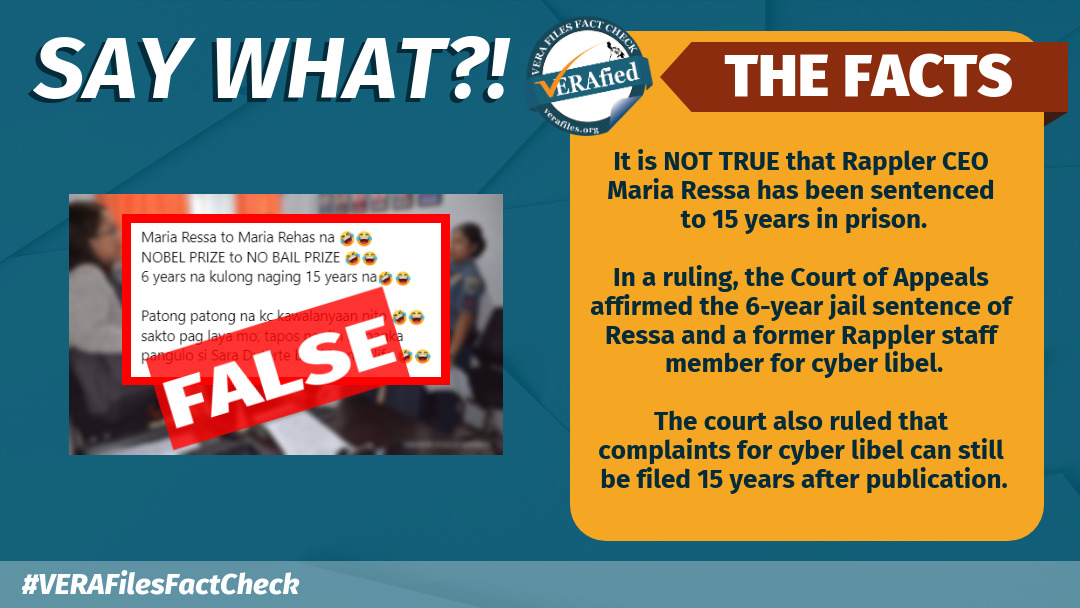Maria Ressa was convicted of the crime of libel for an article published on Feb. 19, 2014, which became the subject of a complaint filed on March 1, 2018. The complaint came four years and 10 days after the publication. The Court of Appeals ruled that the crime had not yet prescribed, citing Article 90, in relation to Article 25 of the Revised Penal Code (CA Decision p. 16-18). The Court of Appeals was guided by the Supreme Court First Division’s decision in the Wilbert Tolentino case.
The decision misapplies the law, if measured by the yardstick of previous en banc decisions, and canons of statutory interpretation, as will be explained below:
Article 25 classifies penalties for offenses into four – capital punishment (death), afflictive penalties (six years and one day to 30 years), correctional (one month and one day to six years), and light (one day to 30 days).
Article 90, on the other hand, provides for prescriptive periods, called statute of limitations in the Anglo countries. Prescription of the crime is the loss by the State of the right to prosecute and punish the offense (People of the Philippines, v. Pascual Castro, G.R. No. L-6407 July 29, 1954, decided en banc). Article 89 of the Revised Penal Code also provides “Criminal liability is totally extinguished: by prescription of the crime.”
In applying Article 90 in relation to Article 25, the Court of Appeals reasoned that the cybercrime law increased the penalty for libel, such that it is now punished by an “afflictive” penalty. The penalty being afflictive, the prescriptive period applicable is the period for afflictive offenses (15 years). For better appreciation, Article 90 is quoted in full below:
Art. 90. Prescription of crime. — Crimes punishable by death, reclusion perpetua or reclusion temporal shall prescribe in 20 years
Crimes punishable by other afflictive penalties shall prescribe in 15 years.
Those punishable by a correctional penalty shall prescribe in 10 years; with the exception of those punishable by arresto mayor, which shall prescribe in five years.
The crime of libel or other similar offenses shall prescribe in one year.
The crime of oral defamation and slander by deed shall prescribe in six months.
Light offenses prescribe in two months.
Note the highlighted text. There is special mention of the crime of libel or “similar offenses,” as well as oral defamation and slander by deed – offenses involving the freedom of expression. Their prescriptive periods are separate from the classes of offenses to which they belong (correctional for libel, before the cyberlaw).
Prior to the cybercrime law, the punishment for libel was prision correccional in its minimum and medium periods. Even then, the general rule that crimes punishable by a correctional penalty prescribed in 10 years, did not apply, because libel prescribed in two years (People of the Philippines v. Generoso Maceda G.R. No. L-48224 Sep. 23, 1942, en banc, People of the Philippines v. Ascencion P. Olarte G.R. No. L-13027 June 30, 1960, en banc). Even a crime punishable only by arresto mayor (lower than libel) prescribed in five years. That was the rule, before R.A. 4661 was enacted on June 18, 1966. The title of Republic Act No. 4661, which amended Article 90 screams the special intent: “An Act Shortening the Prescriptive Period for Libel and Other Similar Offenses, Amending for the Purpose Article Ninety of the Revised Penal Code.”[1]
R.A. 4661 carved out an exception; reducing the prescriptive period, for libel to only one year. The special mention of libel and other crimes of expression, and the separate prescription period, indicates the deliberate intent of Congress to treat libel and crimes involving freedom of expression as special cases. And the reason for that, as the Supreme Court observed, is to “strengthen the arm of the Fourth Estate (press) of our country.” (People of the Philippines v. Ascencion P. Olarte G.R. No. L-13027 June 30, 1960, en banc). Note that R.A. 4661 did not touch the penalties. Libel was still punishable by a correctional penalty, as was imposed in the case of Rufo Quemuel v. Court of Appeals G.R. No. L-22794 Jan. 16, 1968 en banc), if prosecuted within one year.
It is a cardinal rule in statutory interpretation that the specific (R.A. 4661) prevails over the general (Revised Penal Code, Article 25). And since there is a special prescriptive period for libel (one year), that prevails over the general provision for prescription based on classes of offenses.
Did the cybercrime law repeal R.A. 4661? In the first place, they do not even refer to the same subject matter. R.A. 4661specifically shortened the prescriptive period for libel. The cybercrime provision cited by the Court of Appeals was an increase in penalties. One treats of punishment (penalties), the other, of the deadline to prosecute (prescription). It requires no lengthy discussion to show that the subject matter is different. If Congress intended to repeal the special prescriptive period of libel, it would have amended Article 90, by repealing R.A. 4661. That it did not shows the intent not to increase the prescriptive period for libel.
But the cybercrime law contains a repealing clause. Did not the repealing clause repeal the one-year prescriptive period for libel? That repealing clause states: “All laws, decrees or rules inconsistent with this Act are hereby repealed or modified accordingly. Section 33(a) of R.A. 8792 or the “Electronic Commerce Act” is hereby modified accordingly.” (Section 30, R.A. 10175).
That repealing clause specifically mentioned R.A. 8792. So if the cybercrime law intended to repeal R.A. 4661, it would have expressly done so, as it did with regard to R.A. 8792. That is the ruling of the Supreme Court in the earlier case of Alejandro B. Ty v. Hon. Aurelio C. Trampe G.R. No. 117577 Dec.1, 1995 (decided en banc), where it held:
R.A. 7160 has a repealing provision (Section 534) and, if the intention of the legislature was to abrogate P.D. 921, it would have included it in such repealing clause, as it did in expressly rendering of no force and effect several other presidential decrees.
Because there was no mention of P.D. 921 in R.A. 7160, the Supreme Court held that the repeal, if any, was an implied repeal. “The foregoing partakes of the nature of a general repealing provision. It is a basic rule of statutory construction that repeals by implication are not favored. An implied repeal will not be allowed unless it is convincingly and unambiguously demonstrated that the two laws are so clearly repugnant and patently inconsistent that they cannot co-exist.” (Alejandro B. Ty v. Hon. Aurelio C. Trampe G.R. No. 117577 Dec. 1, 1995 (decided en banc).
Can the Supreme Court uphold the Court of Appeals decision in Ressa, saying that the case of Alejandro Ty does not apply? Only if the facts are different, which is not the case. And even if the Supreme Court wanted to, it has to do it en banc. Alejandro Ty was decided en banc. Any en banc decision can only be modified en banc [Constitution Article VIII, Section 4 (3)]. The same applies to the case of Wilbert Tolentino. It was decided by the First Division, so it could not have reversed the doctrine under Alejandro Ty; that special laws cannot be impliedly repealed, if the repealing clause specifically repeals other laws. For R.A. 4661 to be repealed, it must be specifically repealed, in the same way R.A. 8792 was repealed.
“One other rule of interpretation that quarrels with the theory of implied repeal or amendment is that penal law is to be construed, in case of doubt, strictly against the state. “Criminal and penal statutes must be strictly construed, that is, they cannot be enlarged or extended by intendment, implication, or by any equitable considerations. In other words, the language cannot be enlarged beyond the ordinary meaning of its terms in order to carry into effect the general purpose for which the statute was enacted.” (People of the Philippines v. Eugenio Garcia y Madrigal G.R. No. L-2873 Feb. 28, 1950, en banc). Since the cybercrime law only amended the provisions on penalties, it can apply only to penalties, and cannot be enlarged to apply to the special prescriptive period for libel.
Can it be argued that the increase in penalty of libel and the special prescription period cannot coexist? But they already coexisted earlier, did they not? The penalty for libel was formerly a correctional penalty that prescribed in 10 years. But R.A. 4661 expressly reduced the prescription period of libel without touching the penalty. The reverse is true now. Congress increased the penalty, without touching the prescriptive period.
Can it be argued that the intent of Congress is ambiguous, and it could be inferred that Congress intended to repeal R.A. 4661? No. Where there is ambiguity, or “where there is any reasonable doubt, it must be resolved in favor of the person accused of violating the statute; that is, all questions in doubt will be resolved in favor of those from whom the penalty is sought.” (People v. Eugenio Garcia y Madrigal).
Does that invalidate the cybercrime law’s increase of the penalty for libel? No. The increase in penalty is still effective. What is not increased is the time within which the State may seek punishment of a libelous publisher. The State still has one year to prosecute, and ask for the higher penalty.
The accused must be declared acquitted because the crime had already prescribed three years before the complaint was filed.
Disclaimer.
I am not a supporter of Maria Ressa. I did not agree with her efforts against Renato Corona, of whom I am not a fan either. Ressa was a partisan against Renato Corona, not an unbiased journalist. But the law was incorrectly construed, so I have to speak up. If this opinion persuades, Maria Ressa is just a collateral beneficiary.
* Saxxnviolins is a pseudonym of a Filipino lawyer based in the United States
